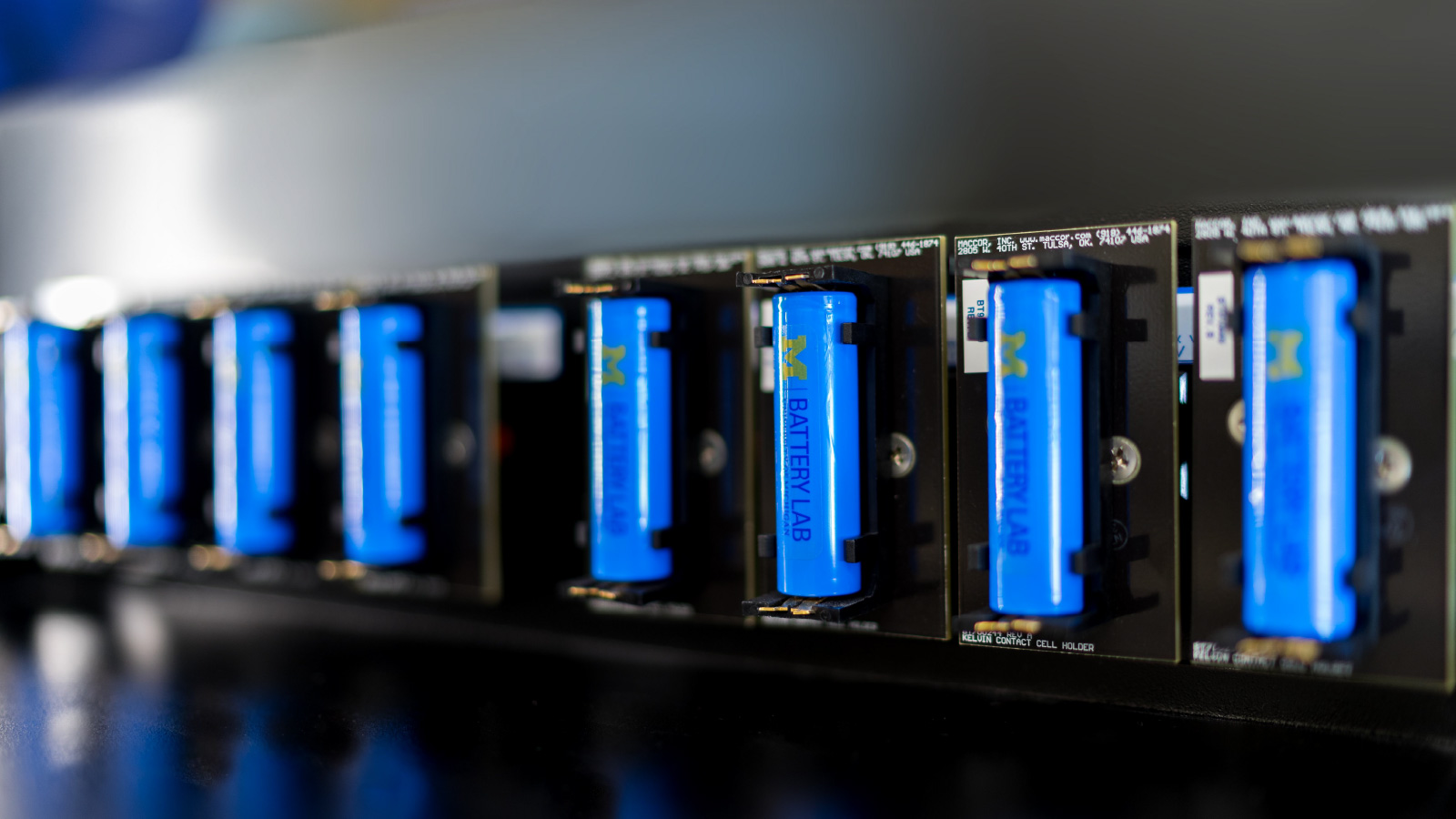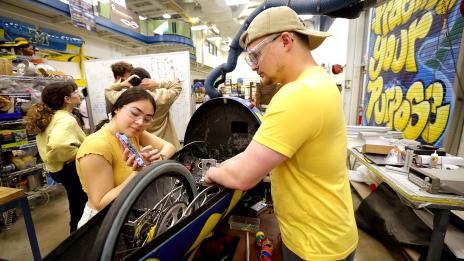By Eric Gallippo | Photos by U‑M Battery Lab
As home to three of the country’s largest automakers, Southeast Michigan is already primed to lead the transition to electric vehicles, according to University of Michigan Electric Vehicle Center (EVC) Director Alan Taub. And with decades of close collaboration with industry partners in Detroit, a highly sought-out battery production and testing lab already online on campus, transformative state investments, and donor support, U‑M is positioned to help lead the charge.
“Our vision is to make Detroit, to make Michigan, the e-motor capital,” Taub said. “That’s what we’re about.”
Launched in 2023 with $130 million from the state, Taub said the center’s goals are to expand U‑M’s facilities and capabilities, jump-start research on electric vehicle components, and attract new automotive and mobility companies to Michigan while helping existing businesses stay and grow here, with an emphasis on the workforce training necessary to move traditional internal combustion engines to electric vehicles.
“The industry's growing, it's transforming; but in addition, we began this whole journey by talking to companies,” Taub said. “We want this to be an industry-driven program as an academic–industry–government collaboration.”
Leading the way on battery technology
Opened in 2015, the EVC’s Battery Lab offers a neutral site where companies can come in and not only produce full-size prototypes of several kinds of batteries, including the large, lithium-ion batteries needed to run electric vehicles, but also bring in their own staff to oversee and learn about the process hands-on. It’s one of two labs like it in the United States, so when founder and director Greg Less opens the appointment bookings for the quarter, they fill up in about 15 minutes.
Although slower than commercial manufacturing, the large-scale equipment allows visiting partners to work at scale on a pilot line ideal for research and development.
“The batteries we make are extremely reproducible, because we're leveraging all of the mass production reproducibility techniques, robotic inspection, et cetera, to get samples that, if I make 10 samples, all 10 samples will behave exactly the same way,” Less said.
This level of precision gives researchers the confidence and evidence needed to approach funders in the private and public sectors as they continue to work to implement their developments.
“They can go to Ford or the Department of Energy or the Department of Defense and say, ‘We're onto something,’” Taub said. “‘You can tell from this data we gathered at Michigan that ours is better than the baseline. Now we need money to help us scale up and make this a real product.’”
Batteries are only one piece of the puzzle; the EVC is also working with the College of Engineering and industry partners to address other onboard components, like motors, to the overall supply chain, from raw materials to end of life. Taub noted that today’s vehicles are highly recycled—at a profit—and electric vehicles need to be the same.
“We have to figure out how to do that for this new major component called the battery. And that's everything from learning how to economically recycle it, but more importantly, to reuse it maybe for the grid and other things,” Taub said.
Building next-generation facilities
To meet growing demand and advance U‑M’s battery production technology, Battery Lab 2.0 will launch later this year. The new facility will feature state-of-the-art, next-generation equipment, enhancing research and production capacity. Meanwhile, the existing Battery Lab 1.0 will continue to produce cells for customers, while also allowing for more time on the equipment allocated for educational and training purposes. The center is also working on initial plans for a dedicated building of its own that will include a third-generation battery lab.
In the meantime, to offer more faculty and lab research capability, the center is working with the college to update the Walter E. Lay Automotive Engineering Laboratory on North Campus, thanks, in part, to a gift to the Mechanical Engineering department from alumnus and EVC advisory board member Justin Mirro (BSE Mech ’91). Historically a combustion engine and transmission research lab, the facility’s automotive bays are ideal for studying electric powertrains, Taub said.
“I want to help modernize it so students, professors, and industry can develop their passion and knowledge, especially in the battery space,” Mirro told Michigan Engineering in September 2023. “On a personal level, I have three daughters (who are all engineers) and I want to make sure that we leave the world cleaner and better for the next generation.”
Retraining tomorrow’s workforce
The center is also working to train the mobility workforce’s next generation, with educational offerings for new and existing workers. It aims to eventually engage more than 1,200 students each year on U‑M’s Ann Arbor, Dearborn, and Flint campuses, and with partner institutions across the state. For now the emphasis is on batteries, including a master's degree in battery engineering to roll out in fall of 2025 that will be followed by one in electric motors and power electronics.
For the last two summers, the center has offered a Battery Bootcamp for educators from local community colleges and, for the first time last summer, high school teachers and students.
“We're trying to fill the pipeline of people who will hopefully come to U‑M interested in electric vehicle technology,” Taub said.
For existing students, he said the opportunity to work with corporate partners to address real world problems is critical.
“A lot of new incoming undergraduates want to work on the solutions to the environmental issues by doing it,” Taub said. “Not just to learn about it, but to learn about it from the aspect of how the industry is going to implement it.”







